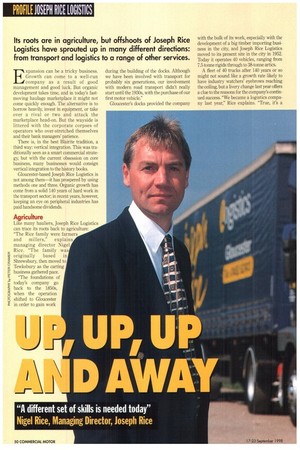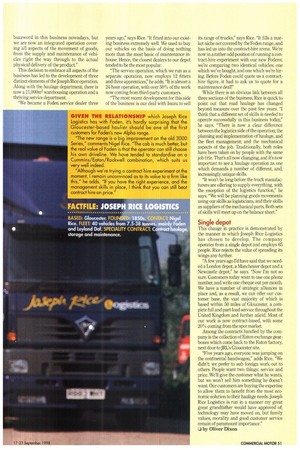Its roots are in agriculture, but offshoots of Joseph Rice
Page 62

Page 63

If you've noticed an error in this article please click here to report it so we can fix it.
Logistics have sprouted up in many different directions: from transport and logistics to a range of other services.
J, xpansion can be a tricky business.
F1/4
Growth can come to a well-run company as a result of good management and good luck. But organic development takes time, and in today's fastmoving haulage marketplace it might not come quickly enough. The alternative is to borrow heavily, invest in equipment, or take over a rival or two and attack the marketplace head-on. But the wayside is littered with the corporate corpses of operators who over-stretched themselves and their bank managers' patience.
There is, in the best Blairite tradition, a third way: vertical integration. This was traditionally seen as a smart commercial strategy, but with the current obsession on core business, many businesses would consign vertical integration to the history books.
Gloucester-based Joseph Rice Logistics is not among them—it has prospered by using methods one and three. Organic growth has come from a solid 140 years of hard work in the transport sector; in recent years, however, keeping an eye on peripheral industries has paid handsome dividend&
Agriculture
Like many hauliers, Joseph Rice Logistics can trace its roots back to agriculture: "The Rice family were farmers and millers," explains managing director Nigel Rice. "The family was
cc
"j originally based in
m < Shrewsbury, then moved to
cc
c.)
c, Tewksbury as the carting w 1business gathered pace. Ill o_ "The foundations of _6 today's company go 1back to the 1850s, ?when the operation 0 shifted to Gloucester E in order to gain work during the building of the docks. Although we have been involved with transport for probably six generations, our involvement with modern road transport didn't really start until the 1930s, with the purchase of our first motor vehicle."
Gloucester's docks provided the company with the bulk of its work, especially with the development of a big timber importing business in the city, and Joseph Rice Logistics moved to its present site in the city in 1952. Today it operates 40 vehicles, ranging from 7.5-tonne rigids through to 38-tonne artics.
A fleet of 40 trucks after 140 years or so might not sound like a growth rate likely to have industry watchers' eyebrows reaching the ceiling, but a livery change last year offers a clue to the reasons for the company's contin ued success. "We became a logistics company last year," Rice explains. "True, it's a
buzzword in this business nowadays, but we are now an integrated operation covering all aspects of the movement of goods, from the supply and maintenance of vehicles right the way through to the actual physical delivery of the product."
This decision to embrace all aspects of the business has led to the development of three distinct elements of the Joseph Rice operation. Along with the haulage department, there is now a 11,000m2 warehousing operation and a thriving service department
"We became a Foden service dealer three
years ago," says Rice. "It fitted into our existing business extremely well. We used to buy our vehicles on the basis of doing nothing• more than the most basic of maintenance inhouse. Hence, the closest dealers to our depot tended to be the most popular.
'The service operation, which we run as a separate operation, now employs 12 fitters and three apprentices,' he adds. "It is almost a 24-hour operation, with over 50% of the work now coming from third-party customers.
"The most recent development for this side of the business is our deal with Isuzu to sell its range of trucks," says Rice. "It fills a market niche not covered by the Foden range, and has led us into the contract-hire arena. We're now in a rather odd position of running a contract-hire experiment with our new Fodens; we're comparing two identical vehicles; one which we've bought, and one which we're hiring. Before Foden could quote us a contracthire figure, it had to ask us to quote for a maintenance dear
While there is an obvious link between all three sections of the business, Rice is quick to point out that road haulage has changed beyond measure over the past few years. "I think that a different set of skills is needed to operate successfully in this business today," he says. "There is now a clear difference between the logistics side of the operation; the planning and implementation of haulage, and the fleet management; and the mechanical aspects of the job. Traditionally, both roles have been taken on by people with the same job title. That's all now changing, and it's now important to see a haulage operation as one which demands a number of different, and, increasingly, unique skills.
"It won't be long before the truck manufacturers are offering to supply everything, with the exception of the logistics function," he says. "We will be planning goods movements using our skills as logisticians, and their skills as suppliers of the mechanical parts. Both sets of skills will meet up on the balance sheet"
Single depot
This change in practice is demonstrated by the manner in which Joseph Rice Logistics has chosen to develop. The company operates from a single depot and employs 65 people. Rice rejects the value of spreading its wings any further.
"A few years ago I'd have said that we needed a London depot, a Manchester depot and a Newcastle depot," he says. "Now I'm not so sure. Customers today want to use one phone number, and write one cheque out per month. We have a number of strategic alliances in place and, as a result, we can offer our customer base, the vast majority of which is based within 50 miles of Gloucester, a complete full and part-load service throughout the United Kingdom and further afield. Most of our work is now contact-based, with some 20% coming from the spot market
Among the contracts handled by the company is the collection of Eaton exchange gearboxes which come back to the Eaton factory, next door to JRL's Gloucester site.
"Five years ago, everyone was jumping on the continental bandwagon," adds Rice. "We didn't; we prefer to sub foreign work out to others. People want two things: service and price. We'll give the customer what he wants, but we won't sell him something he doesn't want. Our customers are buying the expertise to allow them to benefit from the most economic solution to their haulage needs. Joseph Rice Logistics is run in a manner my great great grandfather would have approved of; technology may have moved on, but family values, morality and good customer service remain of paramount importance."
by Oliver Dixon GIVEN THE RELATIONSHIP which Joseph Rice Logistics has with Foden, it's hardly surprising that the Gloucester-based haulier should be one of the first customers for Foden's new Alpha range. "The new range is a big improvement on the old 3000 Series," comments Nigel Rice. "The cab is much better, but the real value of Foden is that the operator can still choose his own driveline. We have tended to standardise on a Cummins/Eaton/Rockwell combination, which suits us very well indeed. "Although we're trying a contract hire experiment at the moment, I remain unconvinced as to its value to a firm like this," he adds, "If you have the right experience, and the management skills in place, I think that you can still beat contract hire on price."
BASED: Gloucester. FOUNIIID: 1850s. CONTACT: Nigel Rice. FLEET: 40 vehicles from 7.5-38 tonnes, mainly Roden and Leyland Daf. SPECIAUTY CONTRACT: Contract haulage, storage and maintenance.




























































































































